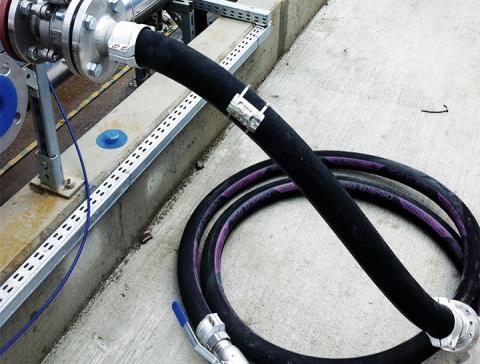The selection of rubber hose materials for construction machinery is crucial, as different materials have different temperature resistance, chemical resistance, and mechanical strength, which directly affect the application range and service life of the hose. The following are several common materials, characteristics, and application analysis of rubber hoses used in construction machinery:
teflon
High temperature resistance and chemical resistance
PTFE (polytetrafluoroethylene) is a high-performance synthetic material widely used in construction machinery due to its excellent high temperature resistance (up to+260 ° C) and chemical resistance. It hardly reacts with any chemicals and can remain stable in extreme environments. This makes PTFE hoses particularly suitable for applications that require high temperature or chemically corrosive environments, such as high-temperature hydraulic systems or chemical transportation.
Electrical insulation and non adhesiveness
In addition to temperature and chemical resistance, PTFE also has good electrical insulation and low friction coefficient, making its surface non adhesive. These characteristics make PTFE hoses perform well in applications that require dust-free or oil-free environments, such as in semiconductor manufacturing equipment or food processing machinery.
polypropylene
Cost effectiveness and moderate temperature resistance
PP (polypropylene) material hoses are more economical and provide good heat and cold resistance (approximately -20 ° C to+110 ° C). Although its temperature resistance is not as good as PTFE, it is sufficient for many general industrial applications. PP hoses are commonly used in applications that do not require extreme temperature or chemical conditions, such as some cooling systems or low-pressure hydraulic systems.
Corrosion resistance and environmental friendliness
Polypropylene materials have good chemical stability against most acid, alkali, and salt solutions, enabling them to withstand the corrosion of most industrial chemicals. In addition, PP hoses use fewer harmful additives in the production process, making them more environmentally friendly and in line with current sustainable development requirements.
nylon
High strength and flexibility
Nylon hoses are known for their excellent physical properties, including high tensile strength and good flexibility. This makes nylon hoses particularly suitable for applications that require frequent movement or bending, such as hydraulic or pneumatic systems in construction machinery. Nylon hoses can maintain their physical properties at different temperatures and are suitable for a temperature range of -40 ° C to+120 ° C.
Wear resistance and oil resistance
Nylon material not only has high strength, but also has good wear resistance and oil resistance, making it an ideal choice for hydraulic oil pipes or fuel pipelines in construction machinery. In these applications, the hose often comes into contact with various lubricants or fuels, and the oil resistance of nylon material ensures the structural integrity and long-term durability of the hose.
epilogue
In summary, rubber hoses used in construction machinery are mainly made of materials such as polytetrafluoroethylene, polypropylene, and nylon, depending on different working environments and requirements. Each material has its unique performance advantages and application scope, and choosing the appropriate material is crucial to ensure the efficient and safe operation of construction machinery systems. By understanding the characteristics of these materials, engineers can better select hoses that are suitable for specific application needs, optimize system performance, and extend service life.

